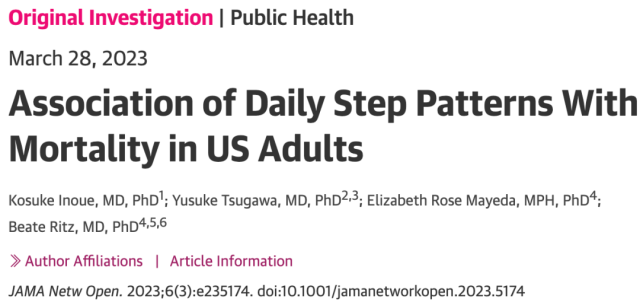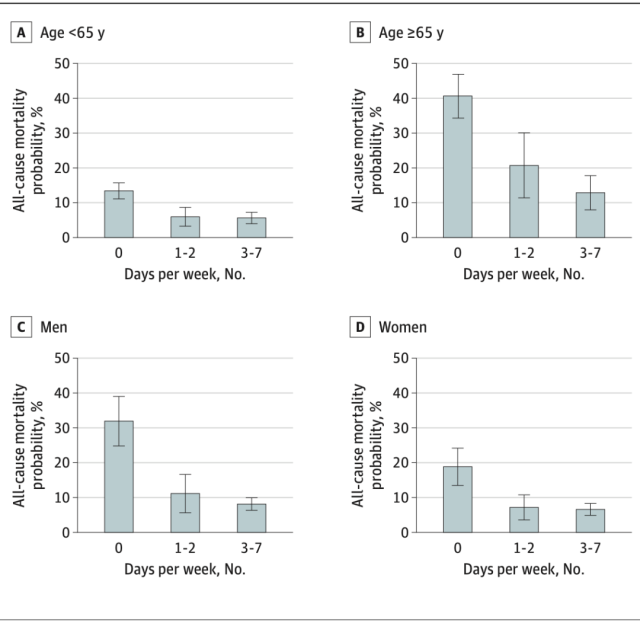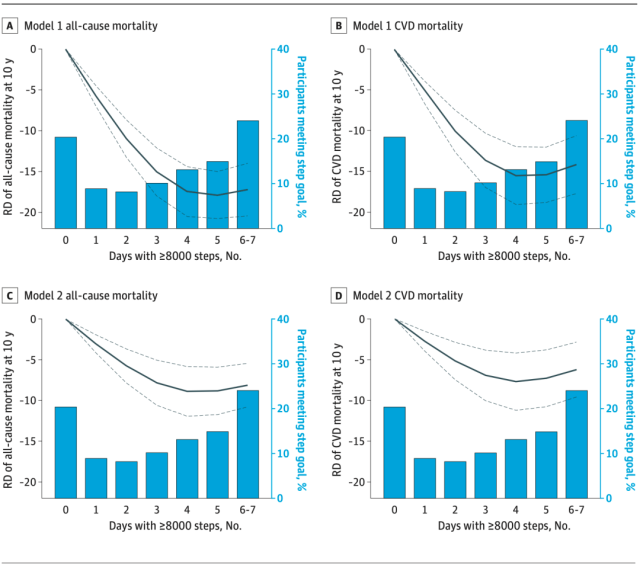The risk of death will drop by 14.9% if over 8000 steps on only 1-2 days per week!
- Normal Liver Cells Found to Promote Cancer Metastasis to the Liver
- Nearly 80% Complete Remission: Breakthrough in ADC Anti-Tumor Treatment
- Vaccination Against Common Diseases May Prevent Dementia!
- New Alzheimer’s Disease (AD) Diagnosis and Staging Criteria
- Breakthrough in Alzheimer’s Disease: New Nasal Spray Halts Cognitive Decline by Targeting Toxic Protein
- Can the Tap Water at the Paris Olympics be Drunk Directly?
The risk of death will drop by 14.9% if over 8000 steps on only 1-2 days per week!
- Should China be held legally responsible for the US’s $18 trillion COVID losses?
- CT Radiation Exposure Linked to Blood Cancer in Children and Adolescents
- FDA has mandated a top-level black box warning for all marketed CAR-T therapies
- Can people with high blood pressure eat peanuts?
- What is the difference between dopamine and dobutamine?
- How long can the patient live after heart stent surgery?
Scientists have confirmed for the first time that the risk of death will drop by 14.9% if the number of steps exceeds 8000 on only 1-2 days per week!
8,000 steps a day, and a new way to walk!
Recently, a research team led by INOUE Kosuke, Assistant Professor of the Graduate School of Medicine, Kyoto University, Japan , published the latest research results in the famous journal JAMA Network Open [1].
Based on 10-year follow-up data, they found that compared with those who did not step 8,000 or more a day a week, the risk of all-cause mortality was 14.9% lower for people who had 1-2 days of steps per week. The risk of all-cause mortality decreased by 16.5% for those who took 8,000 or more steps 3-7 days a week .
It is understood that this study is the first to confirm that only 1-2 days a week with a step count of 8000 or more is enough to reduce the risk of all-cause and cardiovascular death .
For modern people who are busy with work and don’t have enough time to exercise, the research results of Kosuke Inoue’s team are undoubtedly good news.

Screenshot of paper homepage
We all know life is movement.
Unfortunately, busy modern people often don’t have time to exercise.
In 2022, a report released by the World Health Organization (WHO) shows that, as one of the major global public health problems, lack of exercise is the fourth leading cause of death, and about 3.2 million deaths per year are related to it [2] .
In recent years, more and more scientists are exploring simple and effective exercise methods to help modern people reduce the risk of death. For example, studies have found that completing the WHO recommended “at least 150-300 minutes of moderate-intensity aerobic exercise or at least 75-150 minutes of high-intensity aerobic exercise per week” on weekends can also achieve good results. benefit effect [3].
Although this kind of exercise plan proves that “do not exercise at ordinary times, it is useful to supplement on weekends”, but the amount of exercise and exercise time are still not so easy to achieve.
Walking is arguably the easiest form of exercise. A large number of studies have shown that walking ten thousand steps a day can reduce the risk of death from cancer and cardiovascular diseases, and can also prevent dementia [4]. Studies have also found that walking 7000-8000 steps per day can reduce the risk of death [5,6]. A large meta-analysis last year found that increases in daily steps were associated with a decrease in the risk of death, which leveled off at 8000 steps [7].
From this point of view, 8000 steps seems to be a critical point. However, although 8000 steps is equivalent to about 5 kilometers, walking or running 5 kilometers a day is still a huge exercise burden. What Kosuke Inoue and his team wanted to know was how many days a week at least 8,000 steps would be good for health if you were lazy . This problem has not been studied so far.
To address this question, Inoue’s team used 2005-2006 US National Health and Nutrition Examination Survey (NHANES) data. A total of 3101 participants were included in this study. They were aged 20 and above, with an average age of 50.5 years, and 51.0% of them were women.
During the study, participants wore accelerometers for 1 week to monitor exercise status. All participants were divided into three groups according to the number of days they walked 8,000 steps or more per week: 0-day group, 1-2-day group, and 3-7-day group. The primary endpoint of the study was the adjusted absolute risk difference (aRD) for all-cause and cardiovascular death during the 10-year follow-up period .
Among all the participants, 632 (20.4%) walked 8000 steps or more on 0 days per week, 532 (17.2%) walked 8000 steps or more on 1-2 days per week, and 1937 (62.5%) walked 3-3 days per week. Walk 8,000 steps or more in 7 days.
During 10 years of follow-up, 439 people (14.2%) died, of which 148 (5.3%) died from cardiovascular disease. After adjusting for potential confounding factors, participants who walked 8,000 steps or more on 1-2 days per week had a 14.9% lower risk of all-cause mortality compared with participants who walked 8,000 or more steps on 0 days per week. – Participants who walked 8,000 or more steps in 7 days had a 16.5 percent reduction in the risk of all-cause mortality .
Similarly, participants who walked 8000 steps or more on 1-2 days per week had an 8.1% lower risk of cardiovascular death compared with participants who walked 8000 or more steps on 0 days per week, and those who walked 8000 steps 3-7 days per week The risk of cardiovascular death was 8.4% lower for participants who walked or exceeded.

Association of step count with risk of all-cause and cardiovascular death
Kosuke Inoue’s team also studied the relationship between the number of days of walking 8,000 steps and the benefits of different age or gender groups.
In terms of age stratification, compared with participants who walked 8000 steps or more on 0 days per week, both younger and older participants who walked 8000 steps or more on 1-2 days per week had a lower risk of all-cause mortality ( age <65 years: aRD, -7.4%; age ≥65 years: aRD, -19.9%) , younger and older participants who walked 8000 steps or more 3-7 days per week also had a lower risk of all-cause mortality (<65 age: aRD, -7.8%; ≥65 years: aRD, -27.7%) . It is not difficult to see that the elderly aged 65 and above benefit more.
In terms of gender stratification, compared with participants who walked 8000 steps or more on 0 days per week, regardless of gender, those who walked 8000 steps or more per day on 1-2 days per week had a lower risk of all-cause mortality ( male: aRD, – 20.8%; women: aRD, -11.6%) , and a similar trend of benefit was observed 3-7 days a week (men: aRD, -23.8%; women: -12.2%) . It appears that men benefit more.

Benefits of different strata
Overall, this cohort study of US adults showed that the number of days a week in which walking 8000 steps or more was associated with a reduced risk of all-cause and cardiovascular mortality after 10 years.
What’s more, all-cause and cardiovascular mortality was unexpectedly significantly higher even when walking 8000 steps or more on 1-2 days per week compared with those who walked ≥8000 steps 3-7 days per week. It can even be said that the rate of decline is close .
This means that for those who don’t have time to exercise during the week, just taking 8,000 steps a day or two over the weekend can reap meaningful health benefits.
It’s a great thing!
references:
[1].Inoue K, Tsugawa Y, Mayeda ER, Ritz B. Association of Daily Step Patterns With Mortality in US Adults. JAMA Netw Open. 2023;6(3):e235174. Published 2023 Mar 1. doi:10.1001/jamanetworkopen .2023.5174
[2]. https://www.who.int/westernpacific/health-topics/physical-activity
[3].Dos Santos M, Ferrari G, Lee DH, et al. Association of the “Weekend Warrior” and Other Leisure-time Physical Activity Patterns With All-Cause and Cause-Specific Mortality: A Nationwide Cohort Study. JAMA Intern Med .2022. doi:10.1001/jamainternmed.2022.2488
[4].Del Pozo Cruz B, Ahmadi MN, Lee IM, Stamatakis E. Prospective Associations of Daily Step Counts and Intensity With Cancer and Cardiovascular Disease Incidence and Mortality and All-Cause Mortality. JAMA Intern Med. 2022;182(11) :1139-1148. doi:10.1001/jamainternmed.2022.4000
[5]. Paluch AE, Gabriel KP, Fulton JE, et al. Steps per Day and All-Cause Mortality in Middle-aged Adults in the Coronary Artery Risk Development in Young Adults Study. JAMA Netw Open. 2021;4(9) .doi:10.1001/jamanetworkopen.2021.24516
[6].I-Min Lee, Eric J. Shiroma, Masamitsu Kamada et al. Association of Step Volume and Intensity With All-Cause Mortality in Older Women[J]. JAMA Internal Medicine, 2019. DOI:10.1001/jamainternmed.2019.0899
[7]. Paluch AE, Bajpai S, Bassett DR, et al. Daily steps and all-cause mortality: a meta-analysis of 15 international cohorts. Lancet Public Health. 2022;7(3):e219-e228. doi: 10.1016/S2468-2667(21)00302-9
(source:internet, reference only)
Disclaimer of medicaltrend.org
Important Note: The information provided is for informational purposes only and should not be considered as medical advice.



